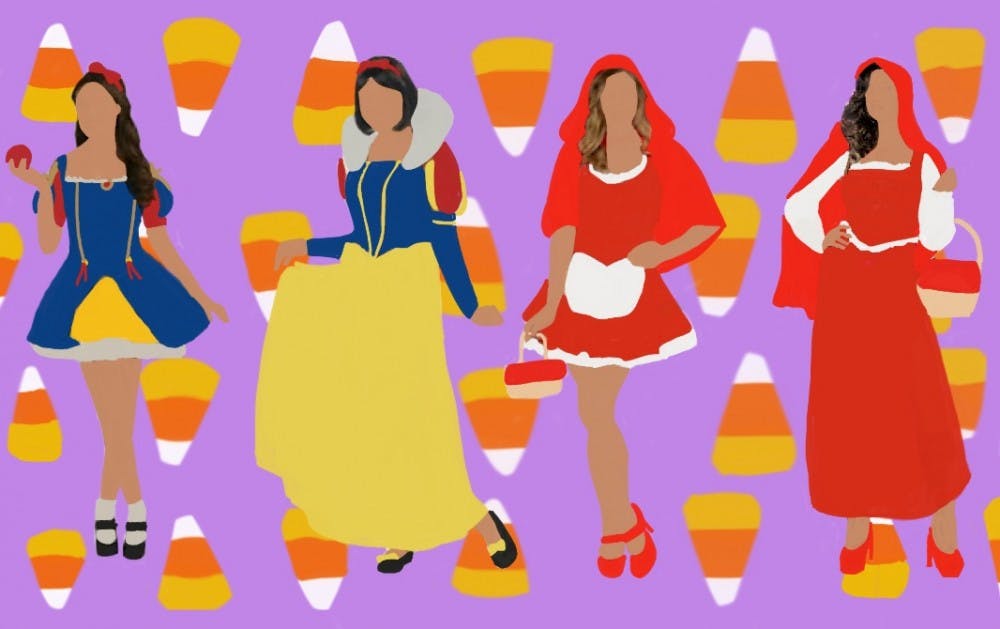Short skirts and thigh-high socks. Tube tops and short-shorts. Platform heels and skin-tight dresses that leave almost nothing to the imagination.
Halloween has been a holiday of controversy for much of modern history, with one of its most recent debates revolving around women's costumes and where a line should, if at all, be drawn.
As Halloween approaches, countless think pieces on the increasing availability of “sexy” costumes for women flood social media, most arguing that the costumes are either an indispensable source of empowerment for women or an obscene mockery of the feminist movement.
Dan Savage, an LGBT journalist, argued Halloween is the equivalent of a heterosexual Pride celebration, and therefore the perfect day for straight women to shamelessly flaunt their sexuality.
In October 2013, ASU landed in the center of this debate when two unidentified ASU students became local Internet sensations for showing up to a Halloween party completely naked.
The women's costumes, or lack thereof, garnered articles from prominent gossip sites like Buzzfeed, Gawker, the Daily Mail and Total Frat Move.
Rose Weitz, an ASU professor of women and gender studies, said she believes there is no way to separate the simultaneously empowering and disempowering nature of sexy costumes.
“You are, on the one hand, wearing a highly sexualized outfit, which is a way for women to take pride in their sexuality, feel that they own their sexuality and enjoy the body that they have,” she said. “The problem with attractiveness as a form of power is that it’s always temporary, always fragile and always dependent on the other person’s judgement.”
Weitz said it is important to remember the context in which many women view their sexuality as a source of empowerment.
“That context is centuries — millennia — in which women have been told that their sexuality is immoral, dangerous to men’s souls, to be hidden, to be contained or controlled, that it belongs to fathers or husbands,” she said. “There are still young women who are thrown out of their house for getting pregnant or for losing their virginity, so there is something very empowering in women being able to now choose to use and display their sexuality for their own purposes.”
Claire Mason, a sophomore studying business who tweeted on the topic, said even when women wear sexualized costumes to attract a partner it’s still an assertion of independence.
“I think that can be empowering because you’re saying, ‘I want to go out and get people attracted to me and possibly hook up with people,'” she said. “I think even just doing it for those reasons can be empowering, because sometimes women aren’t allowed to crave a sex life or go after a sex life, and I feel like that’s weird and messed up.”
While students like Mason show enthusiasm for revealing costumes, Iris Tirado, an employee at Easley’s Fun Shop in downtown Phoenix, said that after 13 years of working in the store it appears to her the “sexy” costume trend is on its way out.
“I want to say about maybe 10 years ago, (sexy costumes) were booming even more so than now," she said. "But I think as women become a little more conservative, it’s kinda died down."
Tirado said the costumes’ drop in popularity may have to do with increased public awareness of potential dangers for women wearing revealing costumes.
Mason said she wanted women’s “sexy” costumes to be viewed in the same way men’s “sexy” costumes are.
“When men do it, it’s more of a funny thing,” Mason said. “It’s not so much just like, ‘Look at their ass,’ or anything. So I think if we try to make it more like that for women, everyone can enjoy showing off their bodies without it possibly being misconstrued by some people.”
Weitz said this double-standard is indicative of a larger power imbalance between men and women, but sexualizing men’s costumes won’t solve any issues.
“I wouldn’t want to live in a world in which men are hyper-sexualized and men are forced into displaying their sexuality and attractiveness all the time,” she said. “I’d rather see a world in which both men and women can enjoy playing with their appearances, figure out what works for them and what they enjoy.”
For Tirado, it all boils down to the age-old rule of minding your own business.
“If nobody wants to see, then don’t look at it,” she said. “You don’t need to make comments. Either don’t look that way or keep it to yourself or say it in your mind … She feels comfortable in it? Let her.”
Reach the reporter at mrobbin9@asu.edu or follow @MelissaARobbins on Twitter.
Like The State Press on Facebook and follow @statepress on Twitter.




